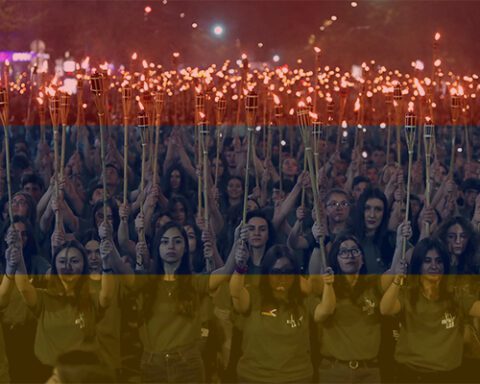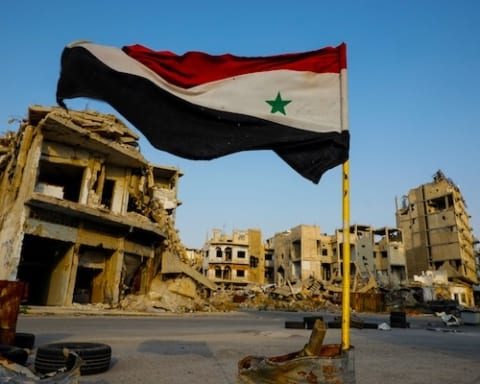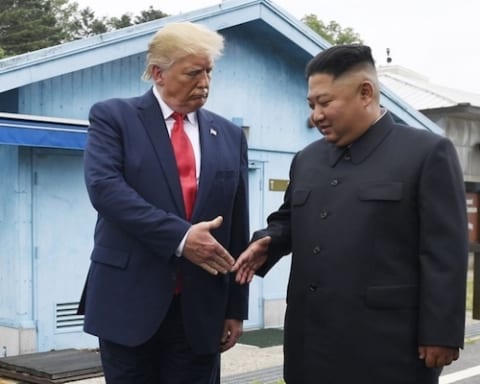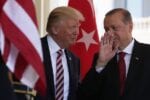11th of August – Lima Charlie’s South East Asia Midweek-in-Review News Briefing
Singapore Armed Forces pledge increased contribution to counter-ISIS coalition.
#Singapore
Last Tuesday, Singapore’s Prime Minister Lee Hsien Loong made an official State visit to Washington DC with his wife, Ho Ching, where he met with US President Barack Obama and first lady Michelle Obama.
The two leaders met in the Oval Office for bilateral talks focused on a wide range of issues, including increasing tensions in the South China Sea, the Trans-Pacific Partnership deal and international security. The meeting was followed by an official State dinner.
PM Lee and President Obama reaffirmed their commitment to the TTP trade deal, despite increased opposition toward the agreement in the U.S. Mr. Obama acknowledged these critics, who have spoken out against the increasing globalization of international trade and outsourcing of jobs.
According to the Wall Street Journal, Obama said, “There’s a real problem but the answer is not cutting off globalization. The answer is how do we make sure that globalization, technology, automation—those things work for us, not against us. TPP is designed to do precisely that.”
PM Lee, fully aware of the challenges of getting the deal passed by Congress, sought to calm anxiety saying, “In terms of economic benefits, the TPP is a big deal. I think in terms of America’s engagement of the region, you have put [your] reputation on the line. It is a big thing that America is doing in the Asia Pacific [region] in the Obama administration.”
“Your partners, your friends who have come to the table, who have negotiated, each one of them has overcome some domestic political objection, some sensitivity, some political cost to come to the table and make this deal. If at the end, waiting at the altar, the bride doesn’t arrive, I think that people are going to be very hurt.”
During their meeting, the two world leaders also discussed the war against ISIS. At a joint news conference, PM Lee announced his country’s armed forces will be contributing to the multinational coalition against the Islamic State. “So the efforts to counter ISIL or ISIS are crucial, and that’s why Singapore is a member of the coalition, and we are making a modest contribution to the efforts, and we are going to be sending a medical team to Iraq.”
Mr. Lee reminded everyone in attendance that ISIS is a problem for all countries around the world.
According to Channel News Asia, Lee spoke of the threat posed by the Islamic State, noting, “We in Southeast Asia are very concerned about this, because the terrorists are active in many countries in the region. Several hundred, perhaps a thousand from Southeast Asia, are in the Middle East fighting ISIS, and we have witnessed attacks in both Indonesia and Malaysia that were mounted by ISIS followers under orders from ISIS operatives in the Middle East to launch attacks in their home countries.
PM Lee’s visit comes at a very interesting time in US-Singaporean relations: it marks the 50th anniversary of diplomatic relations between the two nations and the first time in 30 years that a Singaporean prime minister has made an official state visit to the White House. Not only does it demonstrate the rapport between both nations, but it emphasizes the fact that the US’s shift towards Asia is welcomed by its friends and allies in the region.
#Malaysia
Malaysia as the next potential battleground for ISIS.
This week Malaysians have come to the realization that their country could soon be the next battleground as the Islamic State begins to shift its attention from the Middle East to Southeast Asia.
Last week, an anonymous sender mailed a disturbing letter to the Negeri Sembilan police station, with claims that ISIS plans to target top leaders in Malaysia and around the Southeast Asian region.
In the two page letter, Prime Minister Datuk Seri Najib Razak, his deputy, the Attorney-General, and Inspector-General of Police were all named as potential targets.
The letter also boasted that there were over 700 IS militants in the country who were preparing to fight. Counter-terrorism experts fear that because IS is losing ground in the Middle East, militants could enter the country and become “ghost” terror operatives, as many of them are not yet identified.
In May, US Department of Defense officials projected that ISIS had lost about 45% of the territory it claimed in Iraq and about 10% in Syria. Ahmad El-Muhammady, a Counter-terrorism and intelligence expert, told Channel News Asia, “The area controlled by [IS] is shrinking and this has a psychological impact on them. Even among cyber troopers, they ask questions about what’s going on now.” As a result, the Islamic State is now turning to Southeast Asia to make up for their losses in the Middle East. “How does IS maintain support? They have to go to the second ring of conflict, their neighboring countries, or the third ring of conflict, which is Southeast Asia,” Ahmad told CNA.
Many Counter-terrorism experts would say Malaysia has good reason to be concerned by the looming IS shift because poverty is high and political corruption is rife—two ingredients which make for fertile breeding ground for IS-inspired followers to continue their extremist goals.
#Thailand
Thais vote for military-backed constitution.
On Sunday August 7th, the Thai people approved a junta-backed constitution, ushering in an election next year that will require future elected governments to rule on the military’s terms. The draft constitution referendum took place in the midst of a very controversial political climate.
While the full results are due Wednesday, early results demonstrated that 61.4% of the Thais electorate handed the junta, led by Prime Minister Prayuth Chan-Ocha, a convincing victory. Given the result, this new draft constitution will likely prevent any future military coups by giving the military a permanent role in any newly elected civilian government. It will also suppress political parties and give the military decisive power over future governments and the nation’s economic development.
On Wednesday, in a speech broadcast on all TV channels, former army chief turned Prime Minister Prayut Chan-O-Cha pushed a message of reconciliation, saying:
“I would like us to leave our differences, those feelings of like and dislike, acceptance or disagreement in the ballot boxes and walk forward.”
This new constitution is seen as the most controversial to date. The military will get to appoint almost all 250 members of the future Senate, which will include six seats reserved for military and police chiefs.
There is even a clause that allows the House of Representatives to pick an unelected prime minister to take power in future political crises. In 2014, Army Chief Prayuth Chan-ocha did exactly that, when he led a coup against the elected government of Yingluck Shinawatra and became prime minister himself. Now, Prime Minister Prayuth Chan-ocha rules the nation with his former comrades in the military.
Thailand’s government has defended the controversial new constitution. General Thawip Netniyom, chief of Thailand’s National Security Council (NSC), told Reuters, “They will be sitting there to make sure all the reforms will be carried out and at the same time make sure the newly elected government does exactly what they’re supposed to do.”
Major General Weerachon Sukondhapatipak, the deputy government spokesman, also noted that the draft constitution allows the military and its allies to “legally compel” future governments to execute a 20-year plan rather than their own short-sighted populist policies. Weerachon added that the plan, executed by both the public and private sector, will be divided into five-year periods and provide a blueprint for reforms on social, economic and political issues.
In 1932, the military overthrew Thailand’s absolute monarchy, and since then has staged 19 coups, helping to provide 12 of its 29 prime ministers. Despite this win for the military, there was considerable opposition to the new constitution. Leading up to the vote, the government had cracked down on dozens of political activities and politicians campaigning against the constitutional referendum, thus stopping the opposition from voicing its opinions. The Thai junta and Election Commission of Thailand had even been broadcasting songs and television programs to drum up support for the constitutional referendum. Sunai Phasuk, Human Rights Watch’s senior researcher for Thailand, told the Guardian that such an atmosphere “does not allow Thai voters to make an informed choice.”
Many feared that a rejection of the draft would signal political turmoil. Many foreign embassies from Europe, US and Canada even issued statements telling their citizens to stay away from polling stations during the referendum, due to possible unrest.
On Friday, Gen Prayut attended a ceremony to mark the 129th anniversary of the Chulachomklao Royal Military Academy in Nakhon Nayok Province. Gen. Prayut said, “The government does not want to prolong its power. I keep saying that we must have an election in 2017 because it is the promise made with local and international parties. If I were a dictator as many people said, I would not have to have the referendum or announce the election in 2017.”
Tuesday’s referendum results constitute a hands-down convincing margin of victory for the military government. However, many still believe the junta indirectly encouraged “yes” votes through threat of arrest or intimidation.
Now that the military is enjoying its victory, it seems it will make good on its promise to hold fresh elections at the end of 2017.
#Vietnam
Considered a delicacy, Sago worm banned by Vietnamese government from being served.
The red palm weevil Rhynchophorus ferrugineus, or Sago worm, is considered a delicacy in southern Vietnam. However, local authorities have a different opinion of the delicious little critters and are now enforcing a new law banning the sale of the specialty product, under a decree aimed at protecting plants from insects.
The new law, which came into effect in late June, is aimed at protecting the province of Ben Tre’s 68,000 hectares of coconut trees, which happen to be the weevil’s favorite food.
Thanhnien news reported that a local restaurant, Pham The Hien, was ordered to pay a VND6 million (US$26.8) fine for serving the product. But the ban on these harmful little creatures might be harder to enforce than authorities think. Given its prevalent availability and high demand, the tasty treat is very easy to come by.
#Philippines
President Duterte commands his troops to destroy ISIS militant group.
On Wednesday, President Rodrigo Duterte commanded the Philippines’ Army to destroy the violent Islamic militant group Abu Sayyaf, adding that the country risks being “contaminated” by ISIS. Mr. Duterte’s orders were addressed to soldiers at an army base in the southern province of Zamboanga del Sur.
For over 20 years, the Philippines has battled the militant Abu Sayyaf group with mixed results. The group’s name means “father of the sword smith” in Arabic. The militants are well known for carrying out assassinations, bombings, extortion and kidnappings. Based in Jolo and Basilan Islands, the group is fighting for an independent Islamic province in the Philippines.
Mr. Duterte’s orders come after a video surfaced online in June, showing the Islamic State accepting Abu Sayyaf’s allegiance. Duterte, who has been touring army camps since coming to power five weeks ago, said he planned to recruit 20,000 more soldiers to help protect the country’s territorial integrity. Duterte added, ”We want to control all areas and we don’t want to lose any territory,” reiterating a close alliance with the United States in fighting Islamist militancy, and in the Philippines maritime dispute with China in the South China Sea.
Despite this reminder, it appears that Duterte has touched off a bit of a diplomatic row with his comments. While giving a televised address, he used a homophobic slur in the Tagalog language to express his displeasure with US Ambassador Philip Goldberg. “As you know, I’m fighting with (US Secretary of State John Kerry’s) ambassador. His gay ambassador, the son of a whore. He pissed me off,” Duterte said. It appears that the row started from a disturbing comment Duterte had made in April, about raping an Australian missionary that had been sexually assaulted and murdered in a 1989 prison riot. He was strongly criticized by Goldberg and the Australian Ambassador for these comments.
Duterte also accused Goldberg of “meddling during the elections, giving statements here and there.” Although the comments by Duterte were not welcomed by the US State Department, it appears that the Filipino charge d’affaires, Patrick Chuasoto, was summoned to the State Department to discuss the matter and the comments have not affected Philippine-US relations.”
#Myanmar #Burma
Bumps along the road to a peaceful Burma.
On Monday, State Counselor Aung San Suu Kyi announced that the long awaited Union Peace Conference, better known as the 21st Century Panglong Conference, will begin on August 31. The goal of the conference is to end 68 years of civil conflict between the Burmese Military and Ethnic Armed Organizations, and lay the groundwork to establish a federal union under a democratic system.
This new Conference is named after the 1947 talks hosted by Suu Kyi’s father, General Aung San. The premise of the original conference was to grant full administrative autonomy to the frontier areas pursued by Shan, Kachin and Chinese ethnic groups, to join the Union of Burma. Although the ethnic leaders agreed to join the Union of Burma, and General Aung San assented, the agreement was never honored.
This time around, Aung San Suu Kyi is determined to finish her father’s work and bring accord to the nation of Myanmar, which has suffered under civil conflict since independence from Briton in 1948. However the road to peace will not be easy and requires cooperation between both the Burmese Military and the Ethnic Armed Organizations.
Already, there have been some bumps in the road. In a recently leaked transcript from a meeting between Suu Kyi and the United Nationalities Federal Council (UNFC), the main ethnic armed alliance block, she was quoted as saying “think more of giving rather than taking.” In response, UNFC secretary, Khu Oo Reh, told the press in Rangoon the following day, “What more do they want from us? We have nothing more to give because our natural resources have been destroyed and our people have faced hardship.” This seemed to ruffle some feathers amongst the EAO’s who feel that they are the ones who have suffered the most in the 68 years of civil conflict.
Another issue has been the inclusion of the Myanmar National Democratic Alliance Army, also known as the Kokang, the Ta’ang National Liberation Army and the Arakan Army, who were previously excluded by the military from signing the National Ceasefire Agreement (NCA) back in October of 2015. Their exclusion is the main reason why 10 of the 18 EAO’s didn’t sign the ceasefire accord in October of last year.
Although Suu Kyi has said that this conference would be “all inclusive” no matter if the stake holder has signed the previous NCA or abstained, it seems that the Burmese Military has overridden her call for inclusion. For awhile, the army was demanding that the MNDAA, TLNA and AA surrender their arms before they come to the negotiating table. Now it seems that the army has backtracked on that statement.
The Myanmar Times has reported that Vice Chair U Thein Zaw, the government’s peace commissioner, said the three armed groups must release a joint statement describing their willingness to join the political negotiation, and second, for the duration of the peace negotiations the ethnic groups have to store their arms with a mutually agreed-upon third party. “We do not demand that they surrender their arms into the hands of the Tatmadaw. They just need to place their arms in the hands of allies,” he said.
As of now, there is no word if any of the other three groups will comply with the army’s demands when so much has been sacrificed by the EAO’s.
Approaching the 21st Century Panglong Conference, it is clear that grudges and mistrust are rife amongst all stakeholders.
Please follow Lima Charlie’s ASEAN Bureau for developments on the 21st Century Panglong Conference.
#SouthChinaSea: Update
This week, diplomats and military officers gained intelligence that Vietnam has been quietly fortifying the defenses of several of its islands in the disputed South China Sea, with new state-of-the-art EXTRA rocket artillery systems recently acquired from Israel. These highly accurate mobile rocket launchers are capable of striking China’s runways and military installations in the Spratly Islands.
According to Reuters, the EXTRA rounds are highly accurate up to a range of 150 kilometers, with different 150 kg warheads that can carry high explosives or bomblets and can attack multiple targets simultaneously. The system is operated with targeting drones that can strike both ships and land targets. It uses compact radars, and does not require a large operational footprint. Although Vietnam has larger and longer-range Russian coastal defense missiles, the EXTRA gives the country an edge it didn’t have before.
On Thursday, Philippine Foreign Secretary Perfecto Yasay called on China to respect maritime law and security as well as the rule of law, to resolve disputes in both the South China Sea and the East China Sea. Yasay made this comment while meeting with his Japanese counterpart, Fumio Kishida, to discuss regional security and cooperation on maritime security, with Japan reaffirming its help in the conflict.
“We … urge China to make sure that maritime law and security must be completely and uncompromisingly respected,” Yasay said, adding that the Philippines and Japan shared experiences in the South China Sea and East China Sea. “Everyone must respect our maritime order and security in this area and we urge them to respect the rule of law.”
Next week, Japan is set to deliver the first of 10 coastguard vessels and will be leasing the Philippines four TD-90 surveillance aircrafts.
Meanwhile, Former Philippine President Fidel V. Ramos on Monday officially began his mission as special envoy to China. His first stop will be Hong Kong, where he will meet with some old Chinese friends. According to the AP, Ramos described the trip as a “fishing expedition”, in the first phase on the road map to restarting bilateral talks between the two nations.
On Thursday, China Daily newspaper reported that a newly launched satellite will help China protect its maritime interests. China claims that the Gaofen 3 satellite radar system can capture images from space with a resolution down to 1 meter (3 feet) and can operate in all weather. “The satellite will play an important role in monitoring the marine environment, islands and reefs, and ships and oil rigs,” said project leader Xu Fuxiang. “Satellites like the Gaofen 3 will be very useful in safeguarding the country’s maritime rights and interests,” he added.
This satellite launch comes on the heels of China’s Supreme People’s Court saying there was a “clear legal basis for China to safeguard maritime order, marine safety and interests, and to exercise integrated management over the country’s jurisdictional seas.”
It has been one month since the United Nation’s Permanent Court of Arbitration at The Hague handed down a landmark verdict striking down China’s expansive claims to the South China Sea, and tensions seem to be steadily increasing.
+++ End
For up-to-date news about South East Asia, please join us on Twitter at @LimaCharlieNews
Lima Charlie provides global news, insight and analysis by military veterans and service members Worldwide.
#ASEANNews #ASEAN #LimaCharlie #LimaCharlieNews







![Blossoming Russo-Turkish alliance leaves U.S., NATO behind [Lima Charlie News]](https://limacharlienews.com/wp-content/uploads/2019/07/Russia-Turkey-alliance-leaves-U.S.-NATO-behind-480x384.png)



